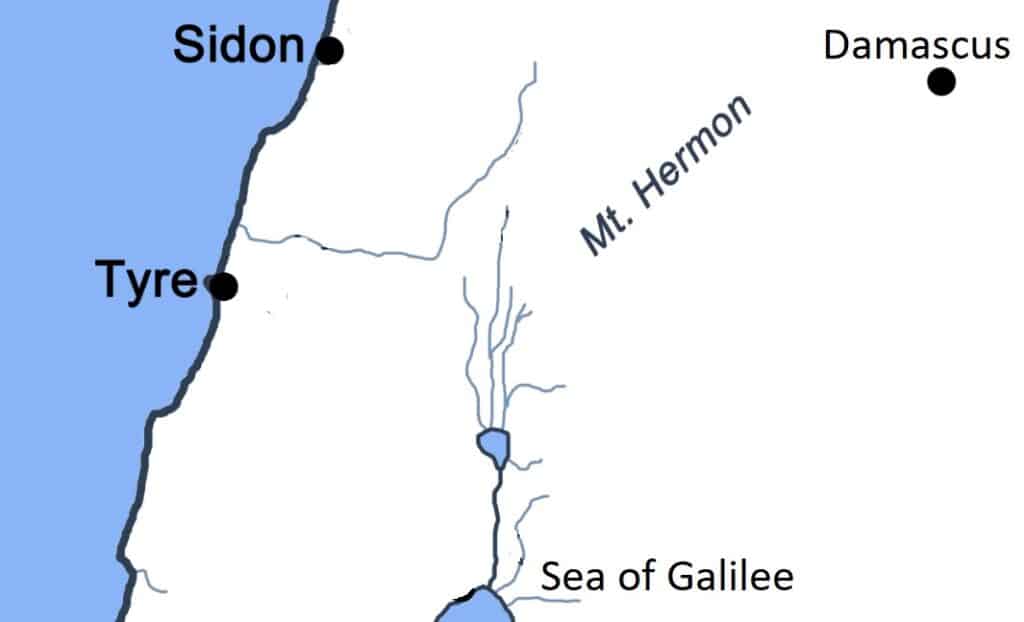GOD’S WORD FOR YOU
1 CHRONICLES 5:23-26
Click to listen to this devotion.
23 The people of the half-tribe of Manasseh were very numerous. They lived in the land of Bashan to the Valley of Hermon, Senir, and Mount Hermon. 24 These were the heads of their clans: Epher, Ishi, Eliel, Azriel, Jeremiah, Hodaviah, and Jahdiel. They were mighty warriors, famous men, heads of their clans. 25 But they were unfaithful to the God of their fathers. They prostituted themselves to the gods of the peoples of the land, whom God had destroyed before them. 26 So the God of Israel stirred up the spirit of Pul, king of Assyria, that is, the spirit of King Tiglath-Pileser of Assyria, and he carried away the Reubenites, the Gadites, and the half-tribe of Manasseh, and brought them to Halah, to Habor, to Hara, and to the river Gozan, where they are to this day.
Mount Hermon is a long, 20-mile slash of mountain range beginning about twenty miles north of the top of the Sea of Galilee and running northeast (exactly like the character / ). The north end of the range is ten miles due west of Damascus.

The Valley of Hermon (literally “Baal Hermon”) was (and is) west of the main peak (Mount Hermon). Senir was well-forested and was a source of many of the massive cedars harvested by Lebanon (Ezekiel 27:5); it was also called the Antilebanon (“the region opposite Lebanon,” Judith 1:7).
Notice that this is the verse when the Scripture informs us that two Assyrian king names, “Pul” (2 Kings 15:19) and “Tiglath-Pileser” (2 Kings 15:29; 16:7,10; 1 Chronicles 5:6; 2 Chronicles 28:20) are references to the same person. Tiglath-Pileser III (ruled 745-727 BC) was more than king of Assyria. He formed the first standing army of that nation, and he led his army around his borders demanding tribute (taxes), and when there was resistance, he homogenized peoples by deporting the rebels and moving in displaced people from other regions. This is what eventually happened to Samaria. In short, Tiglath-Pileser transformed Assyria from a strong kingdom into a strong empire.
Stirred up by the Lord, he deported the Trans-Jordan Hebrews. The places where these exiles were sent to were quite far away. Halah (Strabo calls it Kalachene) was east of the Tigris. Habor is a river there; some commentators think an additional word (“the river” ? ) has dropped from the text, but the ancient accentuation does not indicate anything like that.
These tribes were forced to walk hundreds and hundreds of miles into exile, far from home, and few if any returned. Their descendants, if any, are probably still there to this day. They are in northern Afghanistan, in Armenia, and in Georgia. They were exiled on account of their persistent unbelief. This act of justice and judgement from God is meant to terrify the conscience with the fear of God’s eternal wrath. Human nature is bound to be angry about this justice; those who do not truly know Christ will be confused by God’s wrath, and they will begin to fear and hate God all at the same time. Yet “The Lord is upright… and he does no wrong” (Psalm 92:15). “Indeed” says Moses, “all of his ways are just. He does no wrong. Righteous and upright is he” (Deuteronomy 32:4). So “we must not judge God in his dealings with men by human standards. Whatever God does is right, and it is a heinous blasphemy to accuse him of injustice.”
We might also consider this: The exiles of Reuben, Gad, and Manasseh established a people in those faraway places that were among the first nations to embrace Christianity when it came. Armenia was the first nation on earth to adopt Christianity as the state religion (tradition says that the Apostles Bartholomew and Thaddeus brought the gospel there in the middle of the first century; cp. Matthew 10:3; Mark 3:18). The Georgian and Armenian translations of the New Testament are among the most ancient and reliable translations, and New Testament (that is, Christian) scholars consult those versions for help with modern editions of the Greek text. So this blessing at least can be counted by the Assyrian exile: The Hebrews who were deported to those terribly far, far away places were faced by generations of a fierce and irrefutable proclamation of the law, but their descendants were there to hear the gospel of Jesus Christ from the very earliest days of its preaching in the world. That is to say, in the same generation when the Jews rejected Jesus in Jerusalem, the Hebrew exiles in the former Assyria heard the same gospel, and some or many of them came to put their faith in their Savior. God’s justice and his mercy endure forever. “He loves righteousness and justice, and the mercy of the Lord fills the earth” (Psalm 33:5). We pray:
“Do not cast me from your presence
or take your Holy Spirit from me.
Restore to me the joy of your salvation
and grant me a willing spirit, to sustain me.” (Psalm 51:11-12)
In Christ,
Pastor Timothy Smith
Listen or watch Bible classes online.
Archives at St Paul’s Lutheran Church and Wisconsin Lutheran Chapel:
Pastor Smith serves St. Paul’s Lutheran Church, New Ulm, Minnesota
God’s Word for You – 1 Chronicles 5:23-26 Justice and mercy